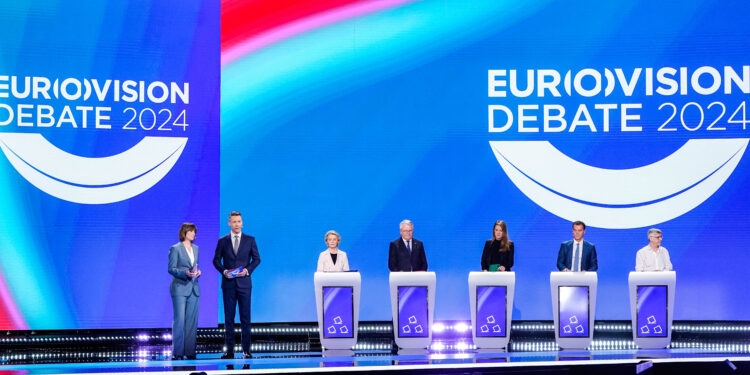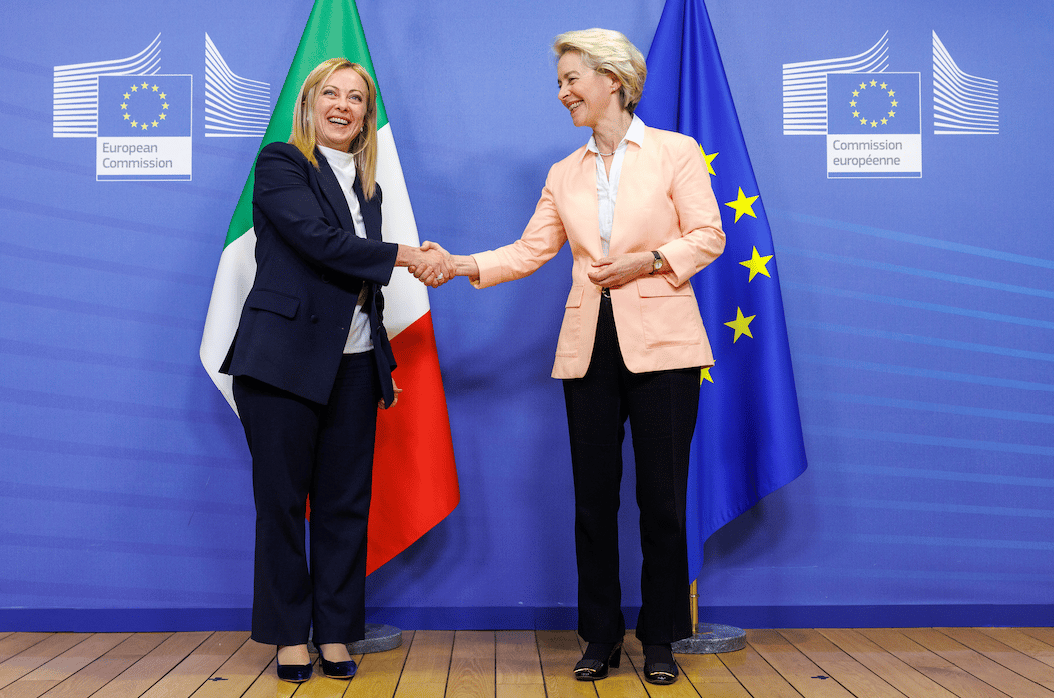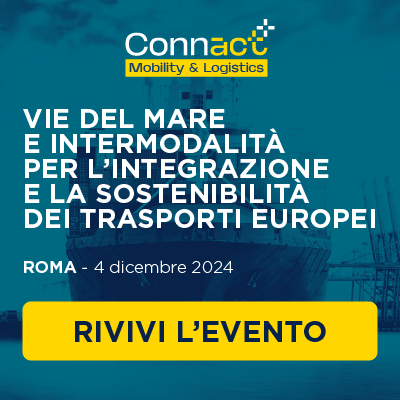Brussels – The premises were all there, and the warnings and indications implied over the past year as well. Yet, it took going all the way to the last election debate before the June 6-9 European elections to get the clear and unequivocal confirmation that the current President of the European Commission and Spitzenkandidatin (joint candidate) of the European People’s Party (EPP), Ursula von der Leyen, is willing to cooperate with the Italian prime minister and chairwoman of the Party of European Conservatives and Reformists (ECR) Giorgia Meloni during the next legislature: “She is definitely pro-European, pro-rule-of-law and anti-Putin, in which case we can offer her cooperation,” said von der Leyen, responding to pressing questions from the moderators of the Eurovision Debate 2024 organized by the European Broadcasting Union (EBU) in the European Parliament today (May 23).

A debate in which candidates from five European political families participated – Ursula von der Leyen for the Populars, Nicolas Schmit for the Social Democrats, Terry Reintke for the European Greens, Sandro Gozi for the liberals of Renew Europe Now and Walter Baier for the Left. The two who have inflamed the debate in the Strasbourg hemicycle precisely because of the potential post-election alliances of the EPP—the conservative and extreme right-wingers of ECR and Identity and Democracy (ID)—did not participate because they chose not to participate in the Spitzenkandidat system. “The European Parliament will form groups after the elections, which is why it is important to establish clear principles with whom we want to work.” Von der Leyen reiterated her three red lines: “To be pro-European, pro-Ukraine—and therefore anti-Putin—and pro-rule-of-law.” Excluded from this new “cordon sanitaire” remain the ID parties, of which the Lega is a member and from which the Germans of Alternative für Deutschland have just been expelled. “Rassemblement National, AfD and Konfederacja have different names but one thing in common: they are friends of Putin and want to destroy Europe.”
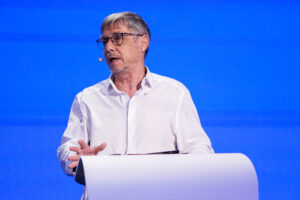
The goal is to “create a strong majority for a strong Europe; the centre must hold,” von der Leyen claimed, not fully unveiling her cards for the post-9 June: “I have not said I intend to collaborate with ECR, I am talking about members of the European Parliament, based on where they will stand, we will decide how a majority can be configured,” because the European Parliament “is different from national parliaments, the majority does not vote unanimously but according to measures,” and this opens up clear scenarios for collaboration with Meloni and future MEPs from Fratelli d’Italia. Along the lines of what went on in 2019, when the von der Leyen cabinet found a majority in the EU Parliament also thanks to the support of part of the ECR group (including the Poles of Law and Justice), but not with an organic alliance. When pressed on the issue of collaboration with Meloni and her principles, von der Leyen explained that she had “a different approach on issues such as Lgbtq+ rights, but now we are talking about MEPs, not groups“, and, in any case, “I worked very well with Meloni in the Council as with the other leaders.”
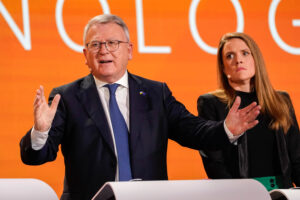
The retort of the Spitzenkandidat of the Party of European Socialism was very harsh: “We need to define what is meant by ‘pro-Europeans,’ I cannot think that Meloni and von der Leyen have the same idea of Europe,” Schmit attacked, making it clear that the Social Democrats will not form alliances “with those who question European values,” including those in Italy who are responsible for an “assault on the media and women’s rights”. The current Luxembourg Commissioner for Labor and Social Rights then recoiled at the press point at the end of the debate, “I don’t make a distinction between Vox and Meloni because every time Vox organizes a conference, Meloni is invited,” in reference to the Spanish far-right party’s latest event on May 19. “What she says there might be a little different from what she says at the European Council, but in the end, it is probably what she really believes,” and for that reason “there is no way to have any kind of agreement with the far right, we are firm and we are clear, we cannot make concessions.” Unlike the ambiguity shown by the EPP, which “did not want to sign the joint statement in order not to seal alliances with the far right,” Schmit attacked again.
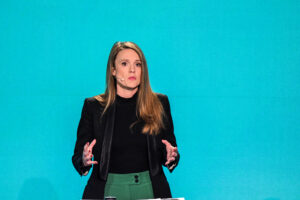
Also in the same vein are the other three Spitzenkandidaten, all opposed to a shift to the right. “We have to avoid seeing friends of Putin in the European Parliament, after the revelations of politicians in contact with Russia and China,” made it clear the current co-chair of the Green/Ale group in the EU Parliament and joint candidate of the European Green Party Reintke, who also insisted that “the Green Deal risks being blown up with an alliance between the EPP and ECR; it would be a risk for nature and for the next generations.” The Austrian Spitzenkandidat of the European Left Party warned that “at the heart of the rise of the far right is the social issue. If we don’t give steady jobs, housing, and a decent life, we won’t win against them,” not forgetting that “we must not absorb the narrative of the right into the political discourse,” Baier added. But all eyes were on Gozi (one of the three common candidates for the Renew Europe Now campaign) since the future of a shift in alliances to the right will depend on the liberals’ intentions: “I don’t understand how the EPP is willing to collaborate with Vox, Meloni and ECR, who want to dismantle Europe from within, the closer the EPP gets to Meloni and ECR, the further away it gets from us,” the secretary general of the European Democratic Party closed the door on this scenario.
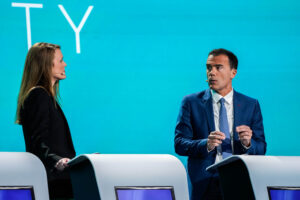
Speaking of liberals, populars, and the far right, it is worth noting that Renew Europe Now’s joint candidate, speaking at the last pre-election European debate, had to untangle himself from what is happening in the Netherlands, where liberals from the People’s Party for Freedom and Democracy (VVD) gave the green light to a government with the anti-immigration, anti-Islamic and strongly Eurosceptic far-right party PVV (Party for Freedom). “It is a big mistake if, at the national level, we start a dialogue with the far right,” Gozi made clear, although he tread water on the Dutch issue, saying that “yes, it would be a big mistake,” but in any case “in the Netherlands there is still no government”. The issue of the possible expulsion of the PVV from the Renew Europe group “will be discussed on June 10 as the first item on the agenda” after the European elections, “then we will decide democratically, and it won’t take years like the EPP on Viktor Orbán or PES on Robert Fico.” An insufficient answer for both Baier and Reintke. “I’m shocked; it’s not possible for liberals to go arm in arm with the far right,” attacked the former. At the same time, the Spitzenkadidatin of the Greens remarked that “liberals have responsibilities, since in the election campaign they did not rule out an alliance with Geert Wilders,” but “we know that you are pro-Europeans and we want to see that, if there are alliances with the far right, there are also consequences.”
English version by the Translation Service of Withub